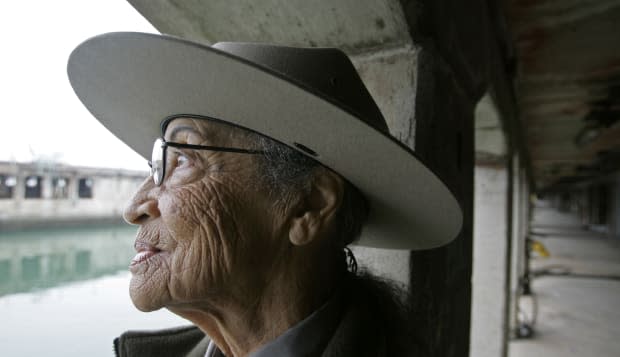Meet the 93-Year-Old Woman Who Still Works 5 Days a Week and Never Wants to Retire

By Rachel Gillett
At 93, Betty Reid Soskin is something of a celebrity.
The park ranger assigned to the Rosie the Riveter-World War II Home Front National Historical Park in Richmond, California, writes frequently on her blog, has a Wikipedia page, and has been interviewed by NPR and People.
She's become so popular, she says, that the park's tour audiences have doubled, tours are now booked months ahead, and the park has added tours to keep up.
There's no question why Soskin enjoys her celebrity status: She's seen it all and has lived "lots and lots of lives," as she tells NPR.
Soskin served as a clerk in an all-black trade union during World War II, became a political activist and noted songwriter during the civil-rights movement, and now interprets her wartime experience through her stories.
But she is not simply the oldest active ranger in the National Park Service — Soskin helped shape what the park has become, first as a consultant and later as an interpretive park ranger.
She works five days a week, about five hours a day, and occasionally works extra hours. Most Wednesdays and Fridays, Soskin will spend the day answering emails and requests from her desk at headquarters in downtown Richmond. On Tuesdays, Thursdays, and Saturdays she'll work at the Visitor Education Center and give two or three presentations in its small theater.
Some days she'll conduct bus tours through the sites that make up the national park or give presentations.
Soskin recently gave Business Insider an inside look at her experience.
Business Insider: How did you get started at the National Park Service?
Betty Reid Soskin: I entered as a state employee at the planning stages of an emerging national park in 2000. One of the scattered sites was the Ford Assembly Plant, which was designed by Albert Kahn and constructed upon state-owned land.
That means that, as a field representative for a member of the California State Assembly, there was a seat at the planning table because that important iconic building had been constructed on state-owned land. It was built on air rights. That placed me at the planning table, which eventually morphed into the role of a consultant to the National Park Service, which then evolved into a contract worker paid for by the Rosie Trust. I resigned my position with the State in 2003.
What were early influences on your career?
When one has lived through nine decades before entering the park service, holding many roles — wife, mother, artist, caretaker, merchant, administrative aide, field representative for a member of the state legislature, administrator for a research project for the UC Berkeley psychology department, chief of staff for a city councilman for the City of Berkeley — all added color to my current career and influences my work in every way.
What skills are most useful to have to be a park ranger?
That would be dependent upon the field in which one is assigned. Since the National Park Service rangers cover the full spectrum of career opportunities — from botany, marine biology, and forestry to communications and graphic design — the required skills would reflect a variety of areas.
If one is in interpretation, people skills are surely a premium, and enough imagination and research abilities to enable one to communicate the themes of any particular park site.
I must admit, though, that I'm not a trained interpreter, and what skills I may process came in with me — having been acquired long before I discovered the park service.
